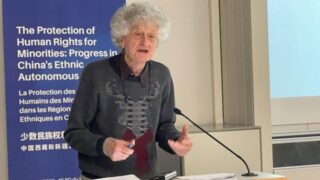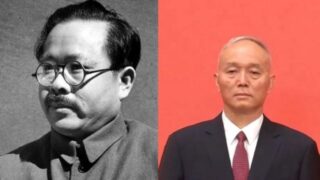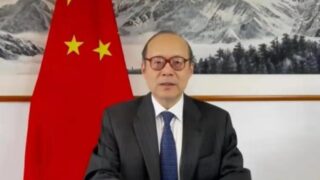The death of a veteran on New Year’s eve resurfaced anxieties about the lengths CCP’s officials would go to keep their posts. For them, human lives mean nothing.
by Lu Xiaojing
The body of Yu Haiping, a veteran who has petitioned the government for years, was found hanging at 5:45 a.m. on December 31, at the entrance to the Bureau of Letters and Calls in Shanxi Province. According to a Radio Free Asia report, Yu Haiping, 62, petitioned the government for six years about the effects the mining industry has had on the environment of his area of residence and other issues. No evidence has been revealed yet as to the cause of Yu Haiping’s death – whether he had committed suicide or was killed.


Ma Bo, a member of the Anti-corruption and Rights Defense Alliance, an organization uniting government petitioners in mainland China, told RFA that she suspects that there was more to the death of Yu Haiping. “It’s possible he has been beaten or poisoned to death,” Ma Bo said, “it [the government] may have created a false impression.” She added that too many similar incidents are known in China, when local governments bribe the families of petitioners who had been beaten to death, threatening them not to make further inquiries. “The incidents are usually settled with nothing resolved,” the activist told RFA.
Video: News about the death of Yu Haiping.
Under such a system, local officials are not interested in petitions reaching higher levels of government to solve the issues they raise. On the contrary, bureaucrats in localities use all means possible to keep them under wraps and restrain petitioners by monitoring, harassing, and intimidating them and their families. People seeking justice are often taken into custody, locked up in mental institutions, and excessive force is commonly used to stifle them. Bitter Winter has previously reported about an 83-year-old petitioner who was severely beaten by government-hired thugs.
The petitioning retired military veterans have always been under the regime’s radar because of their special status. A 2019 circular on stability maintenance measures for the celebration of the 70th anniversary of the founding of Communist China on October 1, 2019, issued by a public security institution in a locality in Henan, marks the veterans in the area who are known to petition the state as surveillance targets. Details of their personal information and all the activities they had organized and shared on the social messaging site WeChat are also listed in the document.
A retired veteran recounted to Bitter Winter his story on how he was surveilled and, he believes, was poisoned by the state, for his petition activities throughout years. For the sake of his safety, he requested anonymity.
“I have participated in crucial battles during the war with Vietnam,” the old man said, unable to hide the pride for his military service. But almost immediately his mood changed, and he added that he often regrets having risked his life for the CCP.
When he retired from the army, the local government did not help him and his fellow veterans to find jobs, nor did it provide them with living allowances. “Since I came back from the army, I have not received a transfer order to civilian life or was given any care or money, not even a penny,” the veteran said. Once a brave soldier, he has been making a living by running a street stall, barely making ends meet.
“I have been to the prefecture-level city’s Bureau of Letters and Calls for about 20 times and six times to both the provincial government and the province’s Department of Letters and Calls,” the man continued his story. “What’s more, I have been to the county’s government, Civil Affairs Bureau, and Bureau of Letters and Calls for more than 100 times. It’s futile. Officials shift responsibility from one to another.”
During the petition trips, he and other veterans were pursued by the local police and armed forces. They perceived it as standard that government personnel would monitor them at all times.
A high-ranking official in the local armed forces once threatened to kill him if his petitions would result in him losing his job. Two months after the threat, the veteran felt poisoning symptoms twice in a row. Because he has some knowledge of medical care, he managed to avoid severe consequences by applying appropriate treatment in time.
“Instead of receiving the treatment I deserve, I am surveilled, controlled, and threatened by the government,” the veteran said. “I never expected this from the state that I have served. I regret having been in the army. When the government wants to use you, they beat drums and gongs when sending you to the battlefield and welcoming you after victorious battles. But when you are of no use for the government, they can do anything they want to you.”










